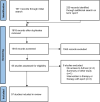Exercise Made Accessible: the Merits of Community-Based Programs for Persons with Parkinson's Disease
- PMID: 37792207
- PMCID: PMC10673991
- DOI: 10.1007/s11910-023-01303-0
Exercise Made Accessible: the Merits of Community-Based Programs for Persons with Parkinson's Disease
Abstract
Purpose of review: Many studies have identified positive effects of physiotherapy and exercise for persons with Parkinson's disease (PD). Most work has thus far focused on the therapeutic modality of exercise as used within physiotherapy programs. Stimulated by these positive findings, there is now a strong move to take exercise out of the clinical setting and to deliver the interventions in the community. Although the goals and effects of many such community-based exercise programs overlap with those of physiotherapy, it has also become more clear that both exercise modalities also differ in various ways. Here, we aim to comprehensively review the evidence for community-based exercise in PD.
Recent findings: Many different types of community-based exercise for people with PD are emerging and they are increasingly being studied. There is a great heterogeneity considering the types of exercise, study designs, and outcome measures used in research on this subject. While this review is positive regarding the feasibility and potential effects of community-based exercise, it is also evident that the general quality of these studies needs improvement. By focusing on community-based exercise, we hope to generate more knowledge on the effects of a wide range of different exercise modalities that can be beneficial for people with PD. This knowledge may help people with PD to select the type and setting of exercise activity that matches best with their personal abilities and preferences. As such, these insights will contribute to an improved self-management of PD.
Keywords: Community-based exercise; Parkinson’s disease; Physiotherapy; Sport.
© 2023. The Author(s).
Conflict of interest statement
The authors declare no competing interests.
Similar articles
-
The efficacy and feasibility of aquatic physiotherapy for people with Parkinson's disease: a systematic review.Disabil Rehabil. 2018 Dec;40(24):2847-2856. doi: 10.1080/09638288.2017.1362710. Epub 2017 Aug 9. Disabil Rehabil. 2018. PMID: 28793808
-
Community aquatic therapy for Parkinson's disease: an international qualitative study.Disabil Rehabil. 2022 Aug;44(16):4379-4388. doi: 10.1080/09638288.2021.1906959. Epub 2021 Apr 7. Disabil Rehabil. 2022. PMID: 33825601
-
Comparison of the Effects of an Exergame-Based Program with Conventional Physiotherapy Protocol Based on Core Areas of the European Guideline on Postural Control, Functional Mobility, and Quality of Life in Patients with Parkinson's Disease: Randomized Clinical Trial.Games Health J. 2023 Jun;12(3):228-241. doi: 10.1089/g4h.2022.0039. Epub 2022 Oct 7. Games Health J. 2023. PMID: 36206023
-
Person-centered home-based rehabilitation for persons with Parkinson's disease: A scoping review.Int J Nurs Stud. 2019 Nov;99:103395. doi: 10.1016/j.ijnurstu.2019.103395. Epub 2019 Aug 15. Int J Nurs Stud. 2019. PMID: 31525645
-
Physiotherapy and Exercise in Parkinson's Disease.Neurol Clin. 2025 May;43(2):427-443. doi: 10.1016/j.ncl.2024.12.014. Epub 2025 Jan 24. Neurol Clin. 2025. PMID: 40185529 Review.
Cited by
-
Understanding personal preferences to promote exercise adherence in Parkinson's disease.Clin Park Relat Disord. 2025 Apr 28;12:100336. doi: 10.1016/j.prdoa.2025.100336. eCollection 2025. Clin Park Relat Disord. 2025. PMID: 40470482 Free PMC article.
References
-
- Keus SH, Munneke M, Graziano M, et al. European physiotherapy guideline for Parkinson’s disease The Netherlands: KNGF/ ParkinsonNet; 2014.
Publication types
MeSH terms
LinkOut - more resources
Full Text Sources
Medical
Research Materials


